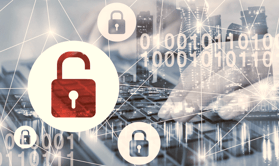.png?width=600&height=200&name=blog.doubleradius.comhubfsDoubleRadius%20Email%20Header%20%20(1).png)
It’s 2023, and every single person you know is somehow using the internet. Some are highly connected — active on multiple social media accounts and asking Google any question that comes to mind. Others might have an email account, but otherwise claim to be computer illiterate. Regardless of just how connected you may be to the Internet of Things, the moment you plugged your information into a form online you’ve released your personal data into the World Wide Web. And organizations who who collect, store, and use that personal information hold a huge responsibility to uphold data privacy.
Why is Data Privacy Important?
Data privacy is defined as protecting personal information from unauthorized use, access, or disclosure. This is very important because it protects the fundamental right to privacy and protects an individual’s rights.
People are entitled to control the way in which their personal information is collected, utilized, and shared, which is why data privacy breaches are taken very seriously. Compromised information can lead to identity theft, financial loss, and even reputational harm.
For organizations that collect personal information from their customers or clients, it is important to maintain and build up trust. A key component to doing so includes carefully securing and safeguarding personal data.
Beyond this, there are many data protection laws set in place by governmental entities, such as the California Consumer Privacy Act (CCPA) and the EU’s General Data Protection Regulation (GDPR). This holds businesses accountable for securing the collected data and only utilizing it as they are authorized to do so.
Safeguarding Against Data Breaches as a Business
There are some things that you can do as a business to protect against possible data security issues.
First, it’s essential to implement a data protection policy that outlines exactly how personal data is being collected, processed, stored, and used. Make sure that this policy is aligned with any relevant compliance regulations, and clearly communicate this policy to your entire organization, from top to bottom. Conduct regular training sessions to educate your employees about compliance laws, best practices, and their individual roles in ensuring data privacy is maintained at all times. 
Cybersecurity measures are an essential part of data privacy and protection strategies. It involves utilizing the right tools to protect digital systems, networks, and data from unauthorized access, theft, or damage. Whether you’re training employees to use strong passwords, implementing access controls, or regularly updating all software and systems with the latest security safeguards, be sure to incorporate cybersecurity tools into your business’s data protection policy.
When collecting personal information, it’s crucial that you have obtained explicit consent from all individuals and clearly explain the purpose and intended use of their data. Be transparent about your data processing policy and their rights according to local compliance regulations.
Once these steps are in place, it’s going to be crucial to conduct regular data audits to ensure the policy is being upheld over time. Review and assess the data that has been collected, as well as the ways in which it’s being stored, and expand the policy as needed. One way companies are ensuring data protection is by investing in a private LTE network that can only be accessed by authorized users.
Consider using encryption, secure storage, access controls, and regular security updates to keep this information as safe as possible. You’ll also want to uncover any potential vulnerabilities or areas that need improvement and make changes to enhance your security measures accordingly.
As a business, it is very important to ensure the personal information gathered from customers is securely stored and monitored at all times. Looking for a new secure solution to add to your technology portfolio? Shoot us an email at sales@doubleradius.com to get started, today.
-1.png?width=450&height=150&name=DoubleRadius%20Email%20Header%20%20(1)-1.png)